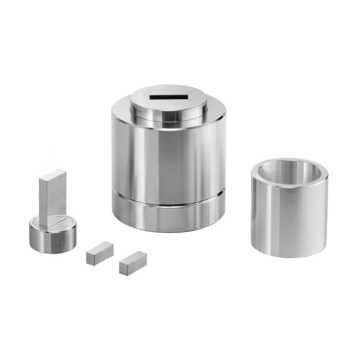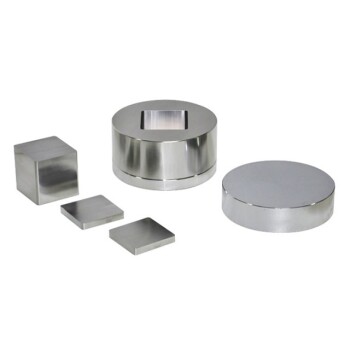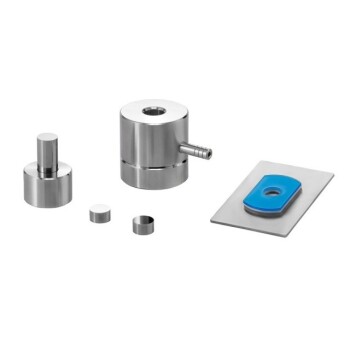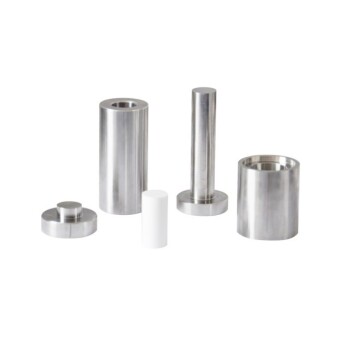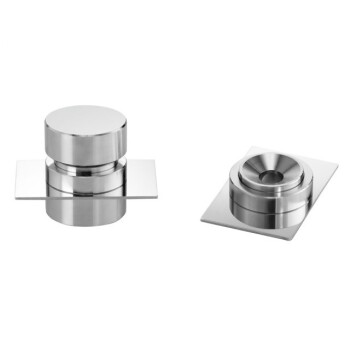At its core, a laboratory press is a foundational tool for materials science, research, and quality control. Its primary applications involve forming, molding, and compacting a vast range of materials—from polymers and ceramics to pharmaceuticals—by applying precise amounts of force, often combined with heat, to create test specimens, pellets, or small-run production parts.
A lab press is more than just a piece of equipment for crushing things. It is a highly controlled instrument for transforming materials, enabling researchers and engineers to consolidate powders, cure resins, and prepare uniform samples for analysis or testing.

The Core Function: Applying Controlled Force and Heat
Before exploring specific industries, it's crucial to understand the fundamental processes a lab press enables. The combination of controlled pressure and temperature is what makes it such a versatile tool.
Compacting and Densification
A primary use is to compress powdered or granular materials into a solid, dense form. This is essential for reducing volume and creating a uniform sample.
This process, often called pelletizing, is critical for preparing samples for analytical techniques where a consistent, solid form is required.
Molding and Forming
By using a specific mold, a lab press shapes materials into a desired geometry. This includes everything from simple "pucks" and test bars to more complex parts.
Heated presses use temperature to melt thermoplastic materials, allowing them to flow and fill the mold cavity before being cooled under pressure.
Curing and Vulcanization
For thermosetting polymers, rubbers, and composites, the press applies heat and pressure to initiate a chemical reaction.
This reaction, known as curing or vulcanization, cross-links the polymer chains, transforming the material from a soft or liquid state into a hard, durable solid.
Lamination and Bonding
A press is also used to bond multiple layers of material together. Pressure and heat are applied to an assembled stack, curing adhesives or fusing thermoplastic layers.
This is the basis for creating composite panels, laminated films, and even printed circuit boards (PCBs).
Key Applications Across Industries
The versatility of a lab press means it is found in nearly every materials-focused laboratory, from academia to heavy industry.
Polymers and Composites
This is arguably the largest application area. Presses are used to compression mold thermoplastic and thermoset materials, cure composite lay-ups (prepregs), and form polymer films.
They are indispensable for creating the standardized test specimens needed for mechanical testing, such as tensile bars or impact testing coupons.
Pharmaceuticals
In the pharmaceutical industry, presses are used to form pills and tablets by compacting powdered active ingredients and excipients.
Researchers also use them to study compaction behavior and create samples for testing drug release rates and material stability.
Ceramics and Powder Metallurgy
For ceramics and metal powders, a hot press can perform a process called hot-press sintering. Here, high temperature and pressure are applied simultaneously to fuse particles together.
This creates dense, high-strength ceramic or metal parts, bricks, and briquettes that would be difficult to produce otherwise.
Analytical Sample Preparation
Many analytical techniques require a solid, homogenous sample. Lab presses are essential for this preparation.
For XRF (X-ray Fluorescence) and FTIR (Fourier Transform Infrared) spectroscopy, powdered samples are pressed into a small, dense pellet, ensuring a consistent and repeatable analysis.
Advanced and New Materials
As new technologies emerge, the lab press remains a vital tool. It is used in the development of new energy materials, such as forming fuel cell membrane electrode assemblies (MEAs) or compacting powders for solid-state batteries.
It is also used in biomaterials research to process biocompatible polymers and composites for medical implants.
Understanding the Trade-offs and Limitations
While incredibly useful, the choice of press and its configuration involves important considerations. A key distinction is between manual and automatic presses.
Manual Presses for Research Flexibility
Manual presses, which rely on a hand-pump to generate force, offer fine control and are ideal for R&D. They allow a researcher to "feel" the material's response.
However, they are operator-dependent, making it difficult to achieve perfect repeatability, which can be a limitation for quality control or production.
Automatic Presses for Consistency
Automatic presses use electric or pneumatic systems to apply force based on a programmed recipe. This ensures that every sample is made with the exact same pressure, temperature, and time profile.
This repeatability is critical for quality control (QC) applications and small-scale, lean manufacturing runs where consistency is paramount.
Making the Right Choice for Your Goal
Your specific application dictates a lab press's role. Consider your primary objective to understand its value.
- If your primary focus is material research and development (R&D): The press is your tool for creating novel materials, testing new formulations, and preparing unique test samples.
- If your primary focus is quality control (QC): The press is your instrument for creating highly consistent, standardized specimens to verify that a material meets specifications.
- If your primary focus is small-scale production: The press serves as a manufacturing machine for creating finished parts, prototypes, or laminated products.
- If your primary focus is analytical chemistry: The press is a sample preparation device, enabling you to convert powders into solid pellets идеальны для spectroscopic analysis.
Ultimately, the laboratory press is a cornerstone of material science, providing a controlled environment to transform raw materials into functional, testable forms.
Summary Table:
| Application Area | Key Uses |
|---|---|
| Polymers and Composites | Compression molding, curing composites, creating test specimens |
| Pharmaceuticals | Forming pills and tablets, studying compaction behavior |
| Ceramics and Powder Metallurgy | Hot-press sintering for dense parts |
| Analytical Sample Preparation | Creating pellets for XRF and FTIR spectroscopy |
| Advanced Materials | Developing energy materials and biomaterials |
Unlock Precision in Your Lab with KINTEK's Advanced Lab Presses
Are you involved in materials science, research, or quality control? KINTEK specializes in high-performance lab press machines, including automatic lab presses, isostatic presses, and heated lab presses, designed to deliver precise force and temperature control for applications like polymer molding, pharmaceutical tablet formation, ceramic sintering, and analytical sample prep. Our equipment ensures repeatability, efficiency, and superior results, helping you achieve consistent outcomes in R&D, QC, or small-scale production. Don't let variability hold you back—contact us today to discuss how our tailored solutions can enhance your laboratory's capabilities and drive innovation!
Visual Guide

Related Products
- Automatic Laboratory Hydraulic Press Lab Pellet Press Machine
- Laboratory Hydraulic Split Electric Lab Pellet Press
- Laboratory Hydraulic Press 2T Lab Pellet Press for KBR FTIR
- Manual Heated Hydraulic Lab Press with Integrated Hot Plates Hydraulic Press Machine
- Lab Heat Press Special Mold
People Also Ask
- What are the key steps for making good KBr pellets? Master Precision for Flawless FTIR Analysis
- What feature of the hydraulic portable press helps monitor the pellet-making process? Discover the Key to Precise Sample Preparation
- What are the advantages of using a hydraulic press for pellet production? Achieve Consistent, High-Quality Samples
- How does a hydraulic press aid in XRF spectroscopy? Achieve Accurate Elemental Analysis with Reliable Sample Prep
- How do hydraulic pellet presses contribute to material testing and research? Unlock Precision in Sample Prep and Simulation





